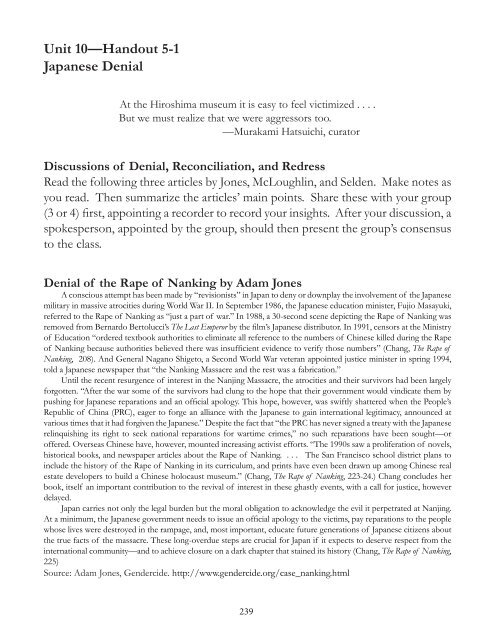Download - Canada ALPHA
Download - Canada ALPHA
Download - Canada ALPHA
Create successful ePaper yourself
Turn your PDF publications into a flip-book with our unique Google optimized e-Paper software.
Unit 10—Handout 5-1<br />
Japanese Denial<br />
At the Hiroshima museum it is easy to feel victimized . . . .<br />
But we must realize that we were aggressors too.<br />
—Murakami Hatsuichi, curator<br />
Discussions of Denial, Reconciliation, and Redress<br />
Read the following three articles by Jones, McLoughlin, and Selden. Make notes as<br />
you read. Then summarize the articles’ main points. Share these with your group<br />
(3 or 4) fi rst, appointing a recorder to record your insights. After your discussion, a<br />
spokesperson, appointed by the group, should then present the group’s consensus<br />
to the class.<br />
Denial of the Rape of Nanking by Adam Jones<br />
A conscious attempt has been made by “revisionists” in Japan to deny or downplay the involvement of the Japanese<br />
military in massive atrocities during World War II. In September 1986, the Japanese education minister, Fujio Masayuki,<br />
referred to the Rape of Nanking as “just a part of war.” In 1988, a 30-second scene depicting the Rape of Nanking was<br />
removed from Bernardo Bertolucci’s The Last Emperor by the fi lm’s Japanese distributor. In 1991, censors at the Ministry<br />
of Education “ordered textbook authorities to eliminate all reference to the numbers of Chinese killed during the Rape<br />
of Nanking because authorities believed there was insuffi cient evidence to verify those numbers” (Chang, The Rape of<br />
Nanking, 208). And General Nagano Shigeto, a Second World War veteran appointed justice minister in spring 1994,<br />
told a Japanese newspaper that “the Nanking Massacre and the rest was a fabrication.”<br />
Until the recent resurgence of interest in the Nanjing Massacre, the atrocities and their survivors had been largely<br />
forgotten. “After the war some of the survivors had clung to the hope that their government would vindicate them by<br />
pushing for Japanese reparations and an offi cial apology. This hope, however, was swiftly shattered when the People’s<br />
Republic of China (PRC), eager to forge an alliance with the Japanese to gain international legitimacy, announced at<br />
various times that it had forgiven the Japanese.” Despite the fact that “the PRC has never signed a treaty with the Japanese<br />
relinquishing its right to seek national reparations for wartime crimes,” no such reparations have been sought—or<br />
offered. Overseas Chinese have, however, mounted increasing activist efforts. “The 1990s saw a proliferation of novels,<br />
historical books, and newspaper articles about the Rape of Nanking. . . . The San Francisco school district plans to<br />
include the history of the Rape of Nanking in its curriculum, and prints have even been drawn up among Chinese real<br />
estate developers to build a Chinese holocaust museum.” (Chang, The Rape of Nanking, 223-24.) Chang concludes her<br />
book, itself an important contribution to the revival of interest in these ghastly events, with a call for justice, however<br />
delayed.<br />
Japan carries not only the legal burden but the moral obligation to acknowledge the evil it perpetrated at Nanjing.<br />
At a minimum, the Japanese government needs to issue an offi cial apology to the victims, pay reparations to the people<br />
whose lives were destroyed in the rampage, and, most important, educate future generations of Japanese citizens about<br />
the true facts of the massacre. These long-overdue steps are crucial for Japan if it expects to deserve respect from the<br />
international community—and to achieve closure on a dark chapter that stained its history (Chang, The Rape of Nanking,<br />
225)<br />
Source: Adam Jones, Gendercide. http://www.gendercide.org/case_nanking.html<br />
239


